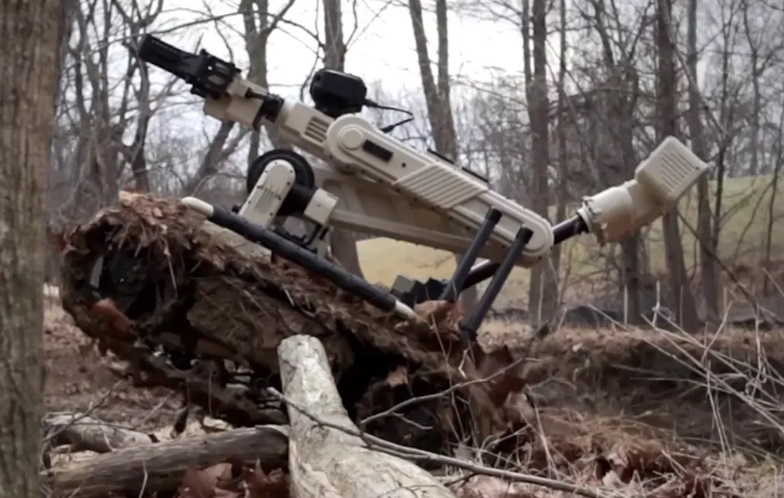
The NZ military has not ruled out buying drones from Israel during the Gaza conflict.
Many countries are shopping for drones, and Israel has some of the most advanced and lethal in the world.
In 2019, the NZ Defence Force bought bomb-clearing robots from Israeli firm Roboteam, well before drones went off as a warfighting essential.
A few days ago, Roboteam talked about the Gaza war letting loose an "orchestra" of drones.
"We connect the drones with the unmanned ground vehicles [UGVs], and then you get a new orchestra of UGVs talking with each other and shooting."
This was a "huge change" from when weaponising drones was banned before the war, it said.
The military here said government procurement rules did not allow bans on firms based on country of origin.
"The NZDF will exclude a supplier from the tender process, if it has sufficient grounds to believe there is evidence of human-rights violations by the supplier or in the supplier's supply chain," it said.
It had "no specific process" to assess that, but concerns might be raised during due diligence checks (listed below).
"Accordingly, the NZDF would not exclude Roboteam based on the fact they are an Israeli-owned company, unless this was a central government direction (for example, if a supplier's country of origin is on a relevant sanctions list)."
No doctrine, no strategy
As drones rapidly become more crucial to warfare and more lethal, the questions around buying and using them increase in significance.
However, the Defence Force admitted it had neither a doctrine nor a strategy for drone development.
"The New Zealand Defence Force (NZDF) does not have drone development strategies nor does it have doctrines around drone development," it said in response to an OIA.
Asked what documents it had about drone rules of engagement in warfare, it provided nothing.
It also lacked any centralised purchasing system for drones - individual units bought their own "as needs require", it said.
It followed the government's "approach to drone regulation and development", but the force last briefed Defence Minister Judith Collins about drones 19 months ago.
'I hope we are buying from New Zealand'
On Thursday, Collins unveiled plans to buy $2.7 billion of US maritime helicopters and large planes from Europe, as signalled in the Defence Capability Plan in April.
Asked later if it would get some drones next up, she said: "Oh, absolutely."
Asked if she would rule out buying them from Israel, given the Gaza war, Collins said: "You know, what I can really say, I hope we are buying from New Zealand."
During the media conference, Collins stressed she wanted a more lethal defence force.
Tauranga company Syos makes surveillance and cargo drones used in the Ukraine war, while other companies also make non-weaponised drones.
Before October 2019, government procurement rules contained no specific reference to human rights issues, the NZDF said.
Budget 2025 provided unspecified funding for counter-drone systems. There are many such systems, including Israeli ones, that shoot drones using roboticised rifles, which can themselves be mounted on drones as an offensive weapon.
The $12b defence capability plan envisages New Zealand buying many more air and sea drones by 2029.
Defence's most recent purchase of four types of surveillance drones did not include any Israeli ones, it said.
Asked how it applied the procurement rules for these, it said: "In accordance with the government procurement rules, the NZDF has not excluded Roboteam from tendering for any of its procurements on the basis of Roboteam's country of origin."
It emphasised to RNZ Roboteam's civilian credentials.
"Roboteam is an entrepreneurial business run from Israel, which is built upon the company's core expertise in design of mobility systems and controls. Much of its business is involved in personal mobility solutions for disabled persons and medical applications," it said.
Roboteam supplies many countries' militaries.
RNZ contacted Roboteam for comment.
Australia buys Israeli drones
On Thursday, Collins re-iterated New Zealand wanted to buy the same military systems as Australia to stay interoperable.
A few days ago, the Australian government laid out plans to spend more than a billion dollars on drones and counterdrones in the next decade. It launched Project LAND 156, which had already granted more than $50m in contracts for counterdrones to local firms.
The project adopted a "continuous modernisation model" critical to ensure investments today would be useful in future, it said. .
Canberra stressed it would buy local, if it could, but in 2022, the Australian army bought Skylark drones from Israeli firm Elbit.
An Elbit Skylark reconnaissance drone crashed in a street in Gaza city last weekend, before an assault by the Israel Defence Force on the city.
The Jerusalem Post reported that Skylarks could help co-ordinate artillery fire.
Last year, Australia did a controversial deal with Elbit to buy turrets worth about a billion dollars.
Reuters has reported on "many" Israeli firms getting "a boost from Israel's war needs".
"Unfortunately, war is good for business and Israel has been a major partner," it quoted Boeing Israel growth and innovation head Ayal Somech on a panel at a conference.
NZDF said due diligence could include, but was not limited to:
- reference checks
- Companies Office checks
- analysis of financial and audited accounts
- validated insurances
- compliance certificate/s checks
- accreditation checks
- police checks
- security clearances
- capacity, capability and demonstrated experience/expertise (physical and documented)
- health and safety
- quality control
- subcontractors' capacity and capability (physical and documented)
- Code of Conduct compliance
- physical premises checks
- IT infrastructure/security












